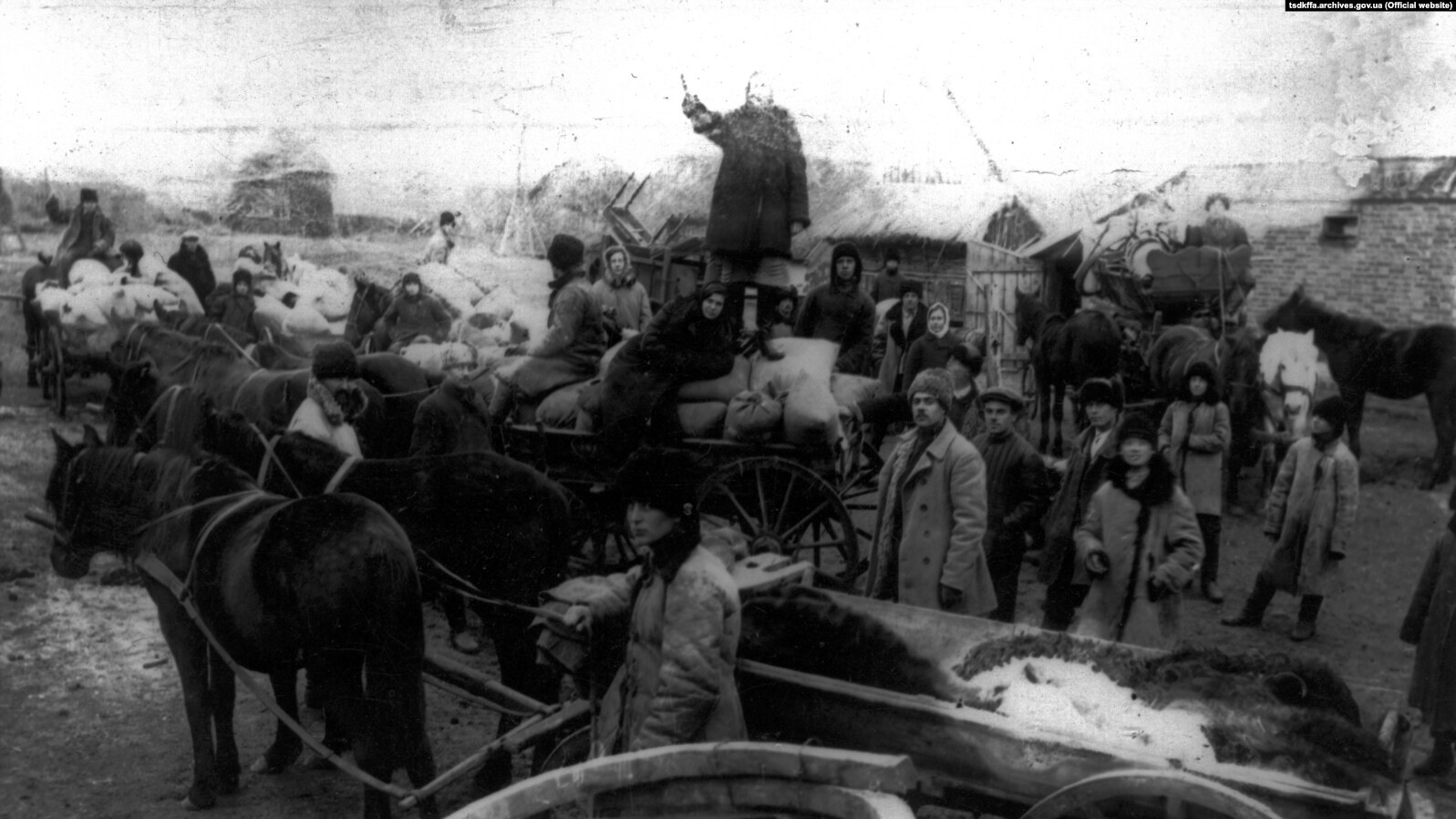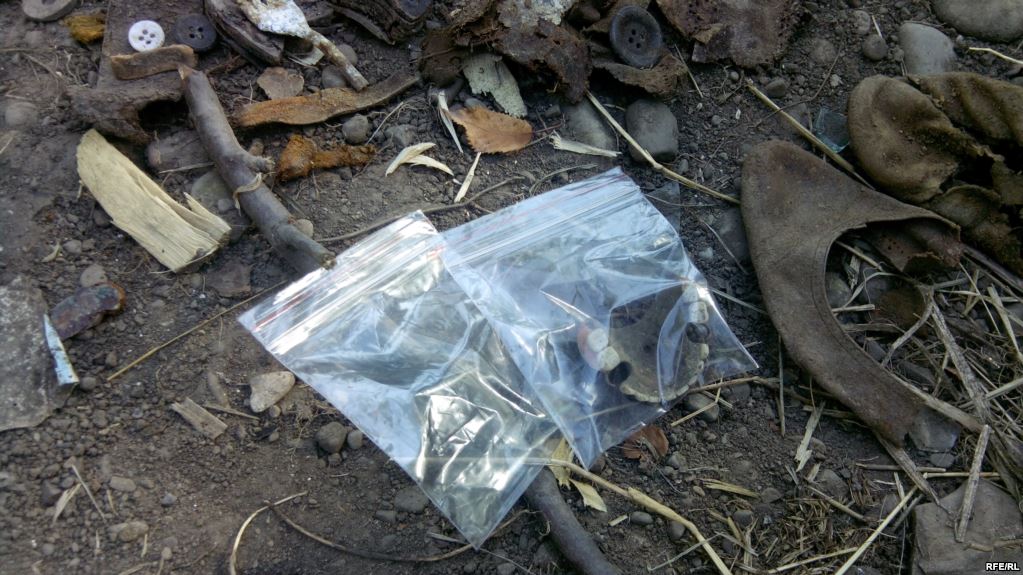Resolution of the Council of the People’s Commissars of the Ukrainian SSR 'On characteristics of kulaks' dated August 13, 1929, adopted by the Chairman of the Council of People’s Commissars of the Ukrainian SSR Comrade Vlas Chubar. This Resolution was issued on the basis of the Resolution of the Council of the People’s Commissar of the USSR 'On characteristics of kulak farms, to which the Labour Law Code should be attached' dated May 21, 1929, and features the policy of collectivization proclaimed by Stalin in December 1929 at the All-Union Conference of Marxist Agrarians. Quotes: Central State Archives of Supreme Bodies of Power and Government of Ukraine (Central Executive Committee of Ukraine), Collection of Laws and Orders of the Worker and Peasant Government of Ukraine in 1929 / People’s Commissariat of Justice - Kharkiv, 1929, p.186
In January 2020 (90th commemoration of the total extermination of private property in the USSR), Radio Liberty and the National Museum of the Holodomor-Genocide launched a special project – ‘Dekulakization: how the Stalinist regime destroyed Ukraine’s free peasant class’. Hundreds of testimonies about dispossessed and persecuted families have been sent to Radio Liberty’s editorial office and been reprinted online.
Here are two more dekulakization narratives recorded by Anatoliy Kovalchuk, who in 1992–1996 worked as executive secretary of the Boryspil District Commission for the Restoration of the Rights of Rehabilitated Persons.
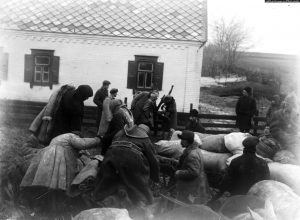
From Mykola Stepanenko, born in 1926 (letter sent to the Rehabilitation Committee)
Ours was a hard-working family, consisting of six persons. In the early 1930s, we resided in the village of Ivankiv, Boryspil Raion.
My father, Petro Stepanenko (1902-1991), was not only a diligent farmer, but also a well-known carpenter in the village. Therefore, the family never suffered any major hardships.
We had a solid, large house with a tiled roof, outbuildings, a carpentry workshop with machines and tools, agricultural equipment, a grain mill, a windmill and many cattle: two horses, oxen, cows, a few sheep and pigs, and poultry. Of course, we also had a large apiary.
In the spring, summer, and fall, my father worked mostly in the fields. In winter, he worked in the barn and in the workshop; he made carts, doors, windows, tables, stools, beds, cabinets, chests, beehives, and other pieces of furniture for the villagers.
My mother did all the housework, baked very tasty bread and pies. In her spare time she also wove and embroidered. She knew a lot of folk songs and taught us to sing and work around the house.
On weekdays, our parents laboured from sunrise to sunset. On Sundays and on major holidays, we always went to church. We, children, were taught to work hard from an early age. Our parents made sure that we completed all our tasks. We were not allowed to loiter or quarrel…
Our parents were our role models. They brought us up to be hard-working, thrifty, honest, obedient and polite… And also humane, generous and friendly.
In the autumn of 1932, a new government was set up in the region. They were brutes who looted our farm and homestead and expelled our family. Under threats of arrest and exile, we were forbidden to return to our home. For a while, we wandered around the countryside, staying with neighbours and relatives. Our mother helped cultivate other people’s fields for a tenth of the harvest.
After looting and confiscating our property, the authorities organized the sale of our belongings and clothes, which the so-called communist “activists” didn’t have time to steal. My father’s prize sheepskin coat was among them.
As winter was approaching and it was getting very cold, my father gave some money to a well-known and honest man - or so he thought - so that the latter would buy and bring him the sheepskin coat. That so-called friend promised to return with the sheepskin, but we never saw the coat or the money.
Later, my father, who was a skilled carpenter, managed to get a job at the Kyiv furniture factory. Thanks to a bribe given to the police, he was able to register in the capital and later managed to move his wife and children to Kyiv. For several years, our large family lived in a room measuring 12 sq.m.
We, children, always slept on the floor. Homework had to be done sitting under the table. During the war, my father moved his family to western Ukraine. He didn’t want to live under communism, so we left Ukraine and emigrated to Canada. There, he also earned a good living as a carpenter.
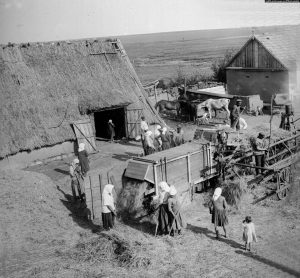
On January 30, 1930, the Politburo of the Central Committee of the CPSU(b) issued a Resolution ‘On measures for the liquidation of kulak property’, which launched widespread repressions against peasants and small landowners, a process known as ‘dekulakization’. The Resolution formally enshrined Stalin’s directives, voiced by the Soviet leader on January 21, 1930 in his appeal ‘On the policy of liquidation of the kulaks as a class’. “In order to eliminate the kulaks as a class, it is necessary to openly break their spirit and resistance, and deprive them of the sources for further existence and development. The party’s current policy in the towns and villages marks a new procedure for eliminating the kulaks as a class,” said Joseph Stalin, secretary general of the Central Committee of the Communist Party of the USSR. Stalin’s first objective was to rid society of the peasantry, which concealed ‘capitalist elements (kulaks)’, and was thus irrevocably hostile to the regime. Dekulakization consisted in expropriation, eviction of entire families, deportation of millions of farmers, and, in the event of resistance, physical annihilation. This Resolution defined dekulakization quotas, i.e. first and second categories for each region or republic of the Soviet Union. The first category kulaks, defined as ‘activists, engaged in counter-revolutionary activities’, were to be arrested and sent to labour camps after a brief appearance before the so-called judicial ‘troika’. The most ‘dangerous’ activists were to be sentenced to death while second-category kulaks, defined as ‘exploiters, but less actively engaged in counter-revolutionary activities’, were to be deported to distant Siberian regions. Dispossessed, deprived of their civic rights, deported, exiled to remote areas of the USSR, these kulak families were assigned to ‘special villages’ run by the OGPU (NKVD as of 1934).

From Mykola Pryhoda, born 1918 (recorded live by the Rehabilitation Committee)
I’m from the village of Lyubartsi, Kyiv Oblast.
In the early 1930s, on the advice of a neighbour, who was also the village teacher, I joined the Komsomol, and my father, in order not to be persecuted, voluntarily handed over all his property to the collective farm.
One day, in the fall of 1932, the head of the village council approached me near the school and said:
“Mykola, where were you when we dekulakized the Hopkalo family? All Komsomol members, except you, were there to help requisition the property of these enemies of the state. You were probably scared, eh? Don’t let this happen again, because we’ll expel you from the Komsomol for sabotage. And now, go to the Hopkalo homestead and drive everyone out of the house. And tell them never to come back... unless they want to be sent to Siberia!”
I was totally confused, so I asked him how to proceed. The village head turned to me and said:
“Look, smoke’s rising from their chimney of their house. So, they’ve returned, but illegally. They’re probably cooking something and warming themselves. All you have to do is enter their home, break the dishes, pour water over the fire, block the chimney and destroy the oven. And, be sure they hear my order – ‘Get the hell out of the village!’ Do this as quickly as possible so that others don’t see what’s happening, because they might beat you up!”
I had no choice. I had to obey, so I went to carry out his order.
Instead of the Hopkalo’s once beautiful, rich homestead, I saw only ruins. The tiles had been removed from the roof of the house and the outbuildings. The lovely blue doors were gone.
Suddenly, I heard children’s voices:
“Mama, where is our dad? Mama, when will dad come home? Mama, I’m hungry!”
No answer, just the quiet sound of someone sobbing…
When I entered the room, I saw something I’ll never forget. The mother was standing near an open fire, weeping quietly and cooking something; four small children were lying on the oven. They looked at me intently and curiously. At that moment, those little kids reminded me of baby swallows peeking out of their nests, waiting for their parents to bring them some food.
-“Why are you here?” the young woman asked quietly, wiping away her tears.
-“I must obey the order issued by the Komsomol. I was told to drive you out of the house and destroy the oven.” I replied timidly.
-“Go ahead! Break and destroy everything! Your damn party has already ruined our lives! Where’s my husband? What’s happened to him?”
I told her I didn’t know anything about her husband, but I’d let them finish their meal, get dressed, and leave the house. I warned them not to return… otherwise, they’d be immediately deported to Siberia.
The mother hugged the youngest child closely to her breast, took another one by the hand; the two older children followed behind. Only after they’d left and shuffling slowly, like beggars, disappeared down the street leading to the fields did I obey the order… I destroyed everything.
I was praised for my actions at the Komsomol meeting and was told that, as a faithful student of Lenin and Stalin, I had correctly understood and implemented the policies of the Communist Party. I never saw the Hopkalo family again… (Mykola Pryhoda turns away and wipes his tears).
As I get older, I feel more and more sorry for what I did. I was young, illiterate and intoxicated by communist propaganda. Today, I understand what really happened. The communists insulted our people, committing unspeakable and vile crimes. And I, an obedient and gullible tool, joined them in their bloody deeds. As Komsomol members, our task was was to break into people’s homes, make a lot of noise to destabilize the inhabitants and prevent them from resisting requisition and exile.
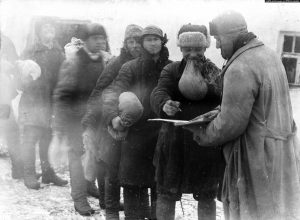
As part of a joint project with the National Museum of the Holodomor-Genocide - ‘Dekulakization: how the Stalinist regime destroyed Ukraine’s free peasant class’ - Radio Liberty asks families who know about their relatives being dekulakized to write and recount their stories. Important information to be included: names and surnames, age, number of family members and years of birth, children, place of residence (village, district, region), possessions (land, livestock, equipment, property), social status, hired workers, etc., as well as how they experienced and survived dekulakization. Facts, reactions and feelings are important. Please send all available photos and documents.
Please write to: [email protected]
TO BE CONTINUED…

